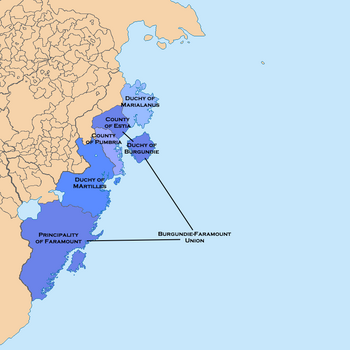Principality of Faramount
This article is a work-in-progress because it is incomplete and pending further input from an author. Note: The contents of this article are not considered canonical and may be inaccurate. Please comment on this article's talk page to share your input, comments and questions. |
| This article is a stub. You can help IxWiki by expanding it. |
Principality of Faramount | |||||||||
|---|---|---|---|---|---|---|---|---|---|
| 1568-1853 | |||||||||
|
Flag | |||||||||
 Map of Faramount and the other coastal Dericanian states in 1854, Faramount | |||||||||
Common languages | Latin | ||||||||
| Religion | Catholic Church | ||||||||
| Demonym(s) | Faramountesc | ||||||||
| Government | Absolute monarchy | ||||||||
| Prince | |||||||||
| Historical era | Early modern period | ||||||||
| |||||||||
| Today part of | |||||||||
Politics and government
Formed in the midst of the Great Confessional War, Faramount embarked on a path that sought to reconcile its historical monarchical legacy inherited from Gassavelia with the evolving demands for political participation, especially after the Cousin's War of the early 17th century, when it established a constitutional monarch in 1635. This approach to governance allowed for some level of political participation for landowners and some city-dwellers (guild members) while retaining much of the autocratic powers of the prince. Faramount's political ethos emphasized a nuanced balance, wherein the prince played a pivotal role in steering the principality's course, but with guidance and consultation from the Concordata, the elected representative body.
Concordata
Members of the Concordata were selected through a combination of hereditary and merit-based systems. Certain seats were reserved for individuals from noble families, preserving a link to Faramount's historical aristocracy. Another portion of seats was allocated through regional elections, where representatives were chosen based on their contributions to the principality's economic, cultural, or intellectual spheres and was a direct result of the Cousin's War. The Concordata served as a vital advisory and legislative body, providing counsel to the prince on matters of governance, policy, and regional affairs. Members represented not only their respective constituencies but also brought forth expertise in areas such as trade, culture, and defense. The council deliberated on proposed laws, taxation, and the foreign policy to include war.
Within the Concordata, specific councils emerged, each specializing in distinct areas of governance. These councils included an Economic Council, responsible for advising on trade and commerce; a Cultural Council, focused on matters related to royal patronage of arts and education; and a Defense Council, providing insights on military strategies and national security. The prince, informed by these specialized councils, could make the ultimate decisions which had no recourse until after the Enlightenment after which the relationship was made more reciprocal.
